Background
Steven George Krantz was born on February 3, 1951, in San Francisco, California, United States. He is the son of Henry A. and Norma O. Krantz. He grew up in Redwood City, California, United States.
1201 Brewster Ave, Redwood City, CA 94062, United States
Sequoia High School where Steven Krantz studied.
1156 High St, Santa Cruz, CA 95064, United States
The University of California, Santa Cruz where Steven Krantz received a Bachelor of Arts degree.
Princeton University, Princeton, NJ 08544, United States
Princeton University where Steven Krantz received a Doctor of Philosophy degree.





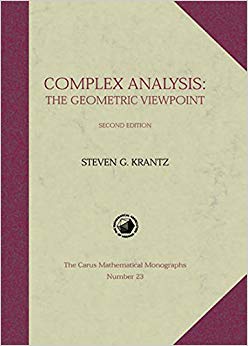
(In Complex Analysis: The Geometric Viewpoint, Steven G. K...)
In Complex Analysis: The Geometric Viewpoint, Steven G. Krantz develops material on classical non-Euclidean geometry. He shows how it can be developed in a natural way from the invariant geometry of the complex disk. He also introduces the Bergmann kernel and metric and provides profound applications, some of which have never appeared in print before.
https://www.amazon.com/gp/product/0883850354/?tag=2022091-20
1990
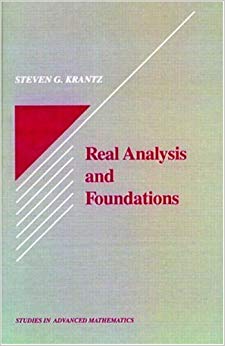
(Real Analysis and Foundations is an advanced undergraduat...)
Real Analysis and Foundations is an advanced undergraduate and first-year graduate textbook that introduces students to introductory topics in real analysis (or real variables), point-set topology, and the calculus of variations. This classroom-tested book features over 350 end-of-chapter exercises that clearly develop and reinforce conceptual topics. It also provides an excellent review chapter on math foundations topics, as well as accessible coverage of classical topics, such as the Weierstrass approximation theorem, Ascoli-Arzela Theorem, and Schroeder-Bernstein Theorem.
https://www.amazon.com/Real-Analysis-Foundations-Steven-Krantz/dp/0849371562
1991
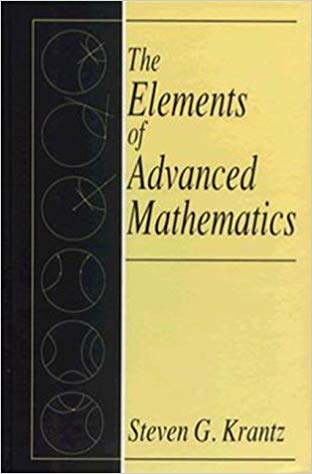
(Clearly written and easy to understand, The Elements of A...)
Clearly written and easy to understand, The Elements of Advanced Mathematics covers logic, set theory, methods of proof, and axiomatic structures, providing an excellent grounding in analytical thinking. It facilitates the transition from elementary mathematics, generally characterized by problem-solving techniques, to advanced mathematics, characterized by theory, rigor, and proofs. This text clearly identifies and explains the components and methods of advanced mathematics. Each chapter contains exercises designed to assist the reader in understanding the material.
https://www.amazon.com/gp/product/0849384915/?tag=2022091-20
1995

(Tracing a path from the earliest beginnings of Fourier se...)
Tracing a path from the earliest beginnings of Fourier series through to the latest research A Panorama of Harmonic Analysis discusses Fourier series of one and several variables, the Fourier transform, spherical harmonics, fractional integrals, and singular integrals on Euclidean space. The climax is a consideration of ideas from the point of view of spaces of homogeneous type, which culminates in a discussion of wavelets. This book is intended for graduate students and advanced undergraduates, and mathematicians of whatever background who want a clear and concise overview of the subject of commutative harmonic analysis.
https://www.amazon.com/gp/product/0883850311/?tag=2022091-20
1999
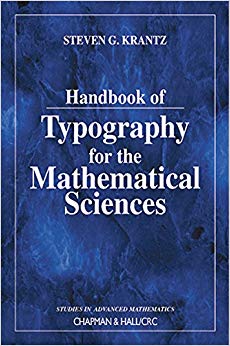
(You know mathematics. You know how to write mathematics. ...)
You know mathematics. You know how to write mathematics. But do you know how to produce clean, clear, well-formatted manuscripts for publication? Do you speak the language of publishers, typesetters, graphics designers, and copy editors? Your page design-the style and format of theorems and equations, running heads and section headings, page breaks, fonts, and spacing-makes the difference between, awkward, hard-to-read publications and coherent, professional ones. The Handbook of Typography for the Mathematical Sciences is your key to exercising control over how your books and articles look, read, and ultimately communicate your ideas.
https://www.amazon.com/gp/product/B00UV9ST4Y/?tag=2022091-20
2000
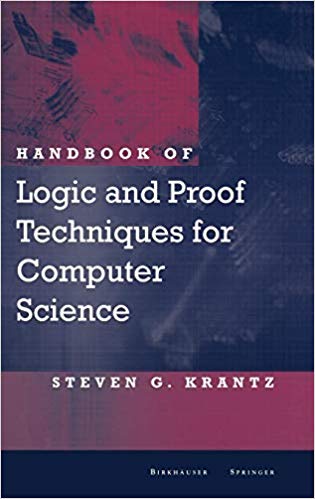
(Logic is and should be, the core subject area of modern m...)
Logic is and should be, the core subject area of modern mathematics. The blueprint for twentieth-century mathematical thought, thanks to Hilbert and Bourbaki, is the axiomatic development of the subject. As a result, logic plays a central conceptual role. At the same time, mathematical logic has grown into one of the most recondite areas of mathematics. Most of the modern logic is inaccessible to all but the special ist. Yet there is a need for many mathematical scientists-not just those engaged in mathematical research-to become conversant with the key ideas of logic. The Handbook of Mathematical Logic, edited by Jon Bar wise, is in point of fact a handbook written by logicians for other mathematicians. It was, at the time of its writing, encyclopedic, authoritative, and up-to-the-moment. But it was, and remains, a comprehensive and authoritative book for the cognoscenti.
https://www.amazon.com/gp/product/081764220X/?tag=2022091-20
2002
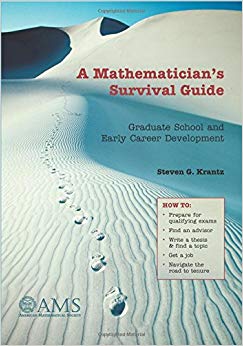
(Graduate school marks the first step toward a career in m...)
Graduate school marks the first step toward a career in mathematics for young mathematicians. During this period, they make important decisions that will affect the rest of their careers. Here now is a detailed guide to help students navigate graduate school and the years that follow. In his inimitable and forthright style, Steven Krantz addresses the major issues of graduate school, including choosing a program, passing the qualifying exams, finding an advisor, writing a thesis, and getting that first job. As with his earlier guide, How to Teach Mathematics, he avoids generalities, giving clear advice on how to handle real situations. The book also contains a description of the basic elements of mathematical education, as well as a glossary and appendices on the structure of a typical department and university and the standard academic ranks.
https://www.amazon.com/gp/product/082183455X/?tag=2022091-20
2003
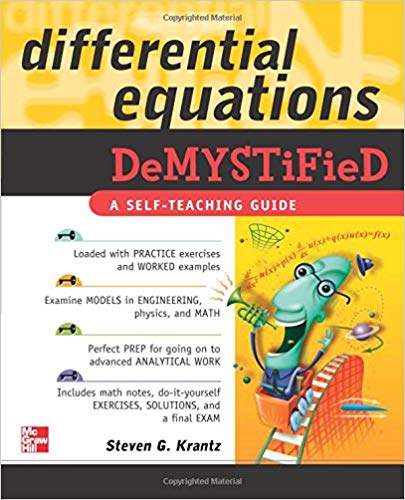
(Here's the perfect self-teaching guide to help anyone mas...)
Here's the perfect self-teaching guide to help anyone master differential equations - a common stumbling block for students looking to progress to advanced topics in both science and math. Covers First Order Equations, Second Order Equations and Higher, Properties, Solutions, Series Solutions, Fourier Series and Orthogonal Systems, Partial Differential Equations and Boundary Value Problems, Numerical Techniques, and more.
https://www.amazon.com/gp/product/0071440259/?tag=2022091-20
2004
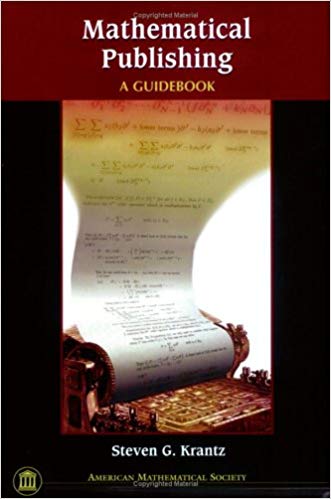
(This new volume is an informative, comprehensive guideboo...)
This new volume is an informative, comprehensive guidebook to publishing mathematics. Krantz describes both the general setting of mathematical publishing and the specifics about all the various publishing situations mathematicians may encounter. As with his other books, Krantz's style is engaging and frank. He gives advice on how to get your book published, how to get organized as an editor, what to do when things go wrong and much more. He describes the people, the language (including a glossary), and the process of publishing both books and journals.
https://www.amazon.com/gp/product/0821836994/?tag=2022091-20
2005
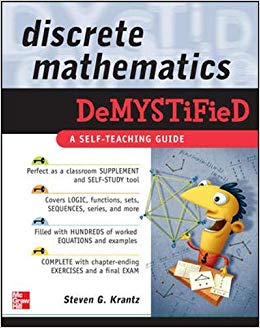
(Discrete Mathematics Demystified explains this challengin...)
Discrete Mathematics Demystified explains this challenging topic in an effective and enlightening way. You will learn about logic, proofs, functions, matrices, sequences, series, and much more. Concise explanations, real-world examples, and worked equations make it easy to understand the material, and end-of-chapter exercises and a final exam help reinforce learning.
https://www.amazon.com/gp/product/007154948X/?tag=2022091-20
2008
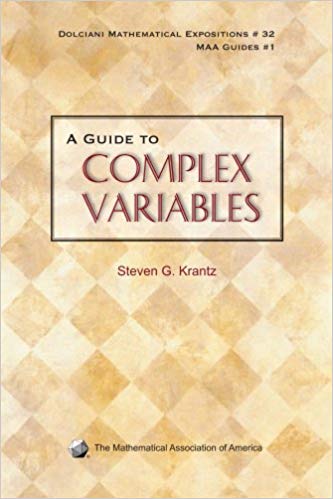
(This quick and easy-to-use guide provides a solid groundi...)
This quick and easy-to-use guide provides a solid grounding in the fundamental area of complex variables. Copious figures and examples are used to illustrate the principal ideas, and the exposition is lively and inviting. In addition to important ideas from the Cauchy theory, the author also includes the Riemann mapping theorem, harmonic functions, the argument principle, general conformal mapping, and dozens of other central topics. An undergraduate taking a first look at the subject, or a graduate student preparing for their qualifying exams, will find this book to be both a valuable resource and a useful companion to more exhaustive texts in the field.
https://www.amazon.com/gp/product/0883853388/?tag=2022091-20
2008
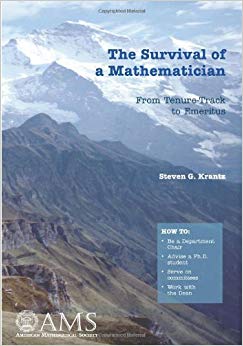
(A successful mathematical career involves doing good math...)
A successful mathematical career involves doing good mathematics, to be sure, but also requires a wide range of skills that are not normally taught in graduate school. The purpose of this book is to provide guidance to the professional mathematician in how to develop and survive in the profession. There is information on how to begin a research program, how to apply for a grant, how to get tenure, how to teach, and how to get along with one's colleagues. After tenure, there is information on how to direct a Ph.D. student, how to serve on committees, and how to serve in various posts in the math department.
https://www.amazon.com/gp/product/0821846299/?tag=2022091-20
2009
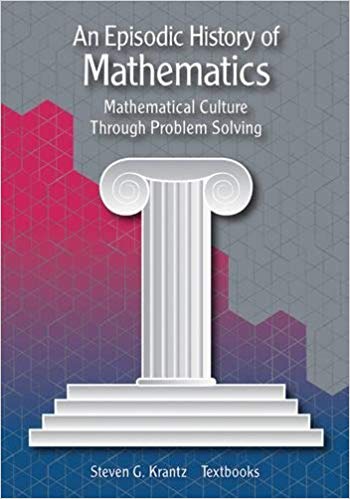
(An Episodic History of Mathematics delivers a series of s...)
An Episodic History of Mathematics delivers a series of snapshots of the history of mathematics from ancient times to the twentieth century. The intent is not to be an encyclopedic history of mathematics, but to give the reader a sense of mathematical culture and history. The book abounds with stories, and personalities play a strong role. The book will introduce readers to some of the genesis of mathematical ideas.
https://www.amazon.com/Episodic-History-Mathematics-Mathematical-Association/dp/0883857669
2010
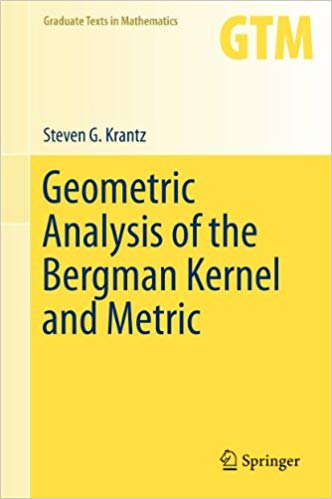
(This text provides a masterful and systematic treatment o...)
This text provides a masterful and systematic treatment of all the basic analytic and geometric aspects of Bergman's classic theory of the kernel and its invariance properties. These include calculation, invariance properties, boundary asymptotics, and asymptotic expansion of the Bergman kernel and metric. Moreover, it presents a unique compendium of results with applications to function theory, geometry, partial differential equations, and interpretations in the language of functional analysis, with emphasis on the several complex variables context. Several of these topics appear here for the first time in book form.
https://www.amazon.com/Geometric-Analysis-Bergman-Graduate-Mathematics-ebook/dp/B00FC1U3B8/?tag=2022091-20
2013

(Foundations of Analysis covers the basics of real analysi...)
Foundations of Analysis covers the basics of real analysis for a one- or two-semester course. In a straightforward and concise way, it helps students understand the key ideas and apply the theorems. The book’s accessible approach will appeal to a wide range of students and instructors.
https://www.amazon.com/gp/product/B00OGLE60E/?tag=2022091-20
2014

(Mathematics is a poem. It is a lucid, sensual, precise ex...)
Mathematics is a poem. It is a lucid, sensual, precise exposition of beautiful ideas directed to specific goals. This book endeavors to tell the story of the modern impact of mathematics, of its trials and triumphs and insights, in language that can be appreciated by a broad audience. It endeavors to show what mathematics means for our lives, how it impacts all of us, and what new thoughts it should cause us to entertain.
https://www.amazon.com/gp/product/1461489385/?tag=2022091-20
2014
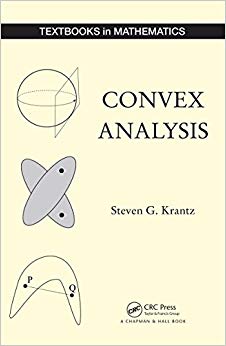
(Convex Analysis introduces analytic tools for studying co...)
Convex Analysis introduces analytic tools for studying convexity and provides analytical applications of the concept. The book includes a general background on a classical geometric theory which allows readers to obtain a glimpse of how modern mathematics is developed and how geometric ideas may be studied analytically. Featuring a user-friendly approach, the book contains copious examples and plenty of figures to illustrate the ideas presented. It also includes an appendix with the technical tools needed to understand certain arguments in the book, a tale of notation, and a thorough glossary to help readers with unfamiliar terms.
https://www.amazon.com/gp/product/B00OYUO52Q/?tag=2022091-20
2014
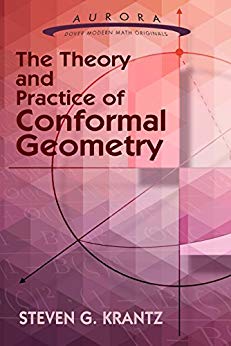
(In this original text, prolific mathematics author Steven...)
In this original text, prolific mathematics author Steven G. Krantz addresses conformal geometry, a subject that has occupied him for four decades and for which he helped to develop some of the modern theory. This book takes readers with a basic grounding in complex variable theory to the forefront of some of the current approaches to the topic. Topics include the Riemann mapping theorem, invariant metrics, normal families, automorphism groups, the Schwarz lemma, harmonic measure, extremal length, analytic capacity, and invariant geometry.
https://www.amazon.com/Theory-Practice-Conformal-Geometry-Aurora-ebook/dp/B01D6O0OIO/?tag=2022091-20
2016
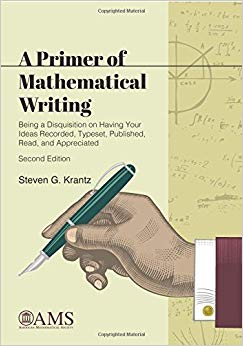
(A Primer of Mathematical Writing: Being a Disquisition on...)
A Primer of Mathematical Writing: Being a Disquisition on Having Your Ideas Recorded, Typeset, Published, Read, and Appreciated is about writing in a professional mathematical environment. While the book is nominally about writing, it's also about how to function in the mathematical profession.
https://www.amazon.com/gp/product/1470436582/?tag=2022091-20
2017
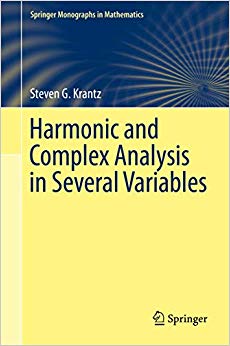
(Authored by a ranking authority in harmonic analysis of s...)
Authored by a ranking authority in harmonic analysis of several complex variables, this book embodies a state-of-the-art entrée at the intersection of two important fields of research: complex analysis and harmonic analysis. Written with the graduate student in mind, it is assumed that the reader has familiarity with the basics of complex analysis of one and several complex variables as well as with real and functional analysis. The monograph is largely self-contained and develops the harmonic analysis of several complex variables from the first principles. The text includes copious examples, explanations, an exhaustive bibliography for further reading, and figures that illustrate the geometric nature of the subject.
https://www.amazon.com/gp/product/B077NDVJ51/?tag=2022091-20
2017

(Elementary Introduction to the Lebesgue Integral is not j...)
Elementary Introduction to the Lebesgue Integral is not just an excellent primer of the Lebesgue integral for undergraduate students but a valuable tool for tomorrow’s mathematicians. Since the early twentieth century, the Lebesgue integral has been a mainstay of mathematical analysis because of its important properties with respect to limits. For this reason, it is vital that mathematical students properly understand the complexities of the Lebesgue integral.
https://www.amazon.com/Elementary-Introduction-Lebesgue-Textbooks-Mathematics-ebook/dp/B07G416XJM/?tag=2022091-20
2018
Steven George Krantz was born on February 3, 1951, in San Francisco, California, United States. He is the son of Henry A. and Norma O. Krantz. He grew up in Redwood City, California, United States.
Steven Krantz finished Sequoia High School in 1967. He received a Bachelor of Arts degree with highest honors from the University of California, Santa Cruz in 1971. In 1974 he received a Doctor of Philosophy degree in mathematics from Princeton University.
Steven G. Krantz began his academic career in 1974 as an assistant professor of mathematics at the University of California, Los Angeles. In 1980 he joined Pennsylvania State University where he was an associate professor at University Park till 1984 when he became a professor. He held this position till 1986. Then he moved to Washington University in St. Louis where he serves as a professor of mathematics from 1986. Professor Krantz's research interests include harmonic analysis, partial differential equations, geometry, interpolation of operators, complex function theory, and real analysis among others.
He was also a visiting professor at the Universite de Paris-Sud in 1977, Princeton University in 1980, Uppsala University and the University of Beijing in 1984, Umeå University and Universidad Autónoma de Madrid in 1986, Mittag-Leffler Institute and Universite Paul Sabatier in 1988, the Polytechnic University of Turin in 1993, and Stanford University in 1997. He was a guest lecturer at dozens of colleges and universities in the United States and abroad. In 1997 Krantz was a Frontiers speaker at Texas A&M University and in 1998 a Nagle Memorial Lecturer at the University of South Florida.
During his career as a scholar, Krantz wrote more than 60 books and more than 175 scholarly papers. He edited some scholarly journals including Notices of the American Mathematical Society (2010-2015), Journal of Mathematical Analysis and Applications, Journal of Geometric Analysis, The American Mathematical Monthly, Complex Variables and Elliptic Equations, The Bulletin of the American Mathematical Society, and Complex Analysis and its Synergies. He is the founder and consulting editor of the series “Studies in Advanced Mathematics” at CRC Press. His monographs include Function Theory of Several Complex Variables, Complex Analysis: The Geometric Viewpoint, A Primer of Real Analytic Functions (with Harold Parks), The Implicit Function Theorem (with Harold Parks), Geometric Integration Theory (with Harold Parks), and The Geometry of Complex Domains (with Kang-Tae Kim and Robert E. Greene).
His book The Proof is in the Pudding: A Look at the Changing Nature of Mathematical Proof looks at the history and evolving nature of the proof concept. Kratz's books Mathematical Apocrypha and Mathematical Apocrypha Redux are collections of anecdotes about famous mathematicians. An Episodic History of Mathematics: Mathematical Culture through Problem Solving is a blend of history and problem-solving. A Mathematician's Survival Guide and The Survival of a Mathematician are about how to get into the mathematics profession and how to survive in the mathematics profession. His most recent book is Elementary Introduction to the Lebesgue Integral (2018). Nowadays, Krantz continues both teaching and writing.
Steven G. Krantz was recognized for his scholar and writing activity. He received numerous awards and honors including grants from the National Science Foundation, Fund for the Improvement of Post-Secondary Education, Chauvenet Prize from Mathematical Association of America, Beckenbach Book Award, Kemper Prize, Outstanding Academic Book Award, and the UCLA Alumni Foundation Distinguished Teaching Award. In 2009 he became Sequoia High School Hall of Fame inductee. He was listed in Who's Who and American Men and Women of Science.
(Tracing a path from the earliest beginnings of Fourier se...)
1999(Real Analysis and Foundations is an advanced undergraduat...)
1991(Authored by a ranking authority in harmonic analysis of s...)
2017(Clearly written and easy to understand, The Elements of A...)
1995(A Primer of Mathematical Writing: Being a Disquisition on...)
2017(Here's the perfect self-teaching guide to help anyone mas...)
2004(Elementary Introduction to the Lebesgue Integral is not j...)
2018(This text provides a masterful and systematic treatment o...)
2013(A successful mathematical career involves doing good math...)
2009(An Episodic History of Mathematics delivers a series of s...)
2010(Convex Analysis introduces analytic tools for studying co...)
2014(This quick and easy-to-use guide provides a solid groundi...)
2008(Discrete Mathematics Demystified explains this challengin...)
2008(Graduate school marks the first step toward a career in m...)
2003(Foundations of Analysis covers the basics of real analysi...)
2014(This new volume is an informative, comprehensive guideboo...)
2005(Logic is and should be, the core subject area of modern m...)
2002(In this original text, prolific mathematics author Steven...)
2016(In Complex Analysis: The Geometric Viewpoint, Steven G. K...)
1990(Mathematics is a poem. It is a lucid, sensual, precise ex...)
2014(You know mathematics. You know how to write mathematics. ...)
2000
Quotations:
"I write in order to share my thoughts with a broad audience. My writing process is to sit down and do it. I do not believe in ‘writer’s block'."
"Being a mathematician is a bit like being a manic depressive: you spend your life alternating between giddy elation and black despair."
"A mathematician experiments, amasses information, makes a conjecture, finds out that it does not work, gets confused and then tries to recover. A good mathematician eventually does so - and proves a theorem."
Steven Krantz is a member of the Mathematical Association of America and Academic Authors Association.
Quotes from others about the person
"Steve Krantz writes good mathematics books: he has written many and they do the job well. Krantz (actually, I’ve known him for over forty years, so I’ll just call him what I always call him, Steve) is an excellent teacher and knows his audience." - Michael Berg
Steven Krantz married Randi D. Ruden on September 7, 1974.
